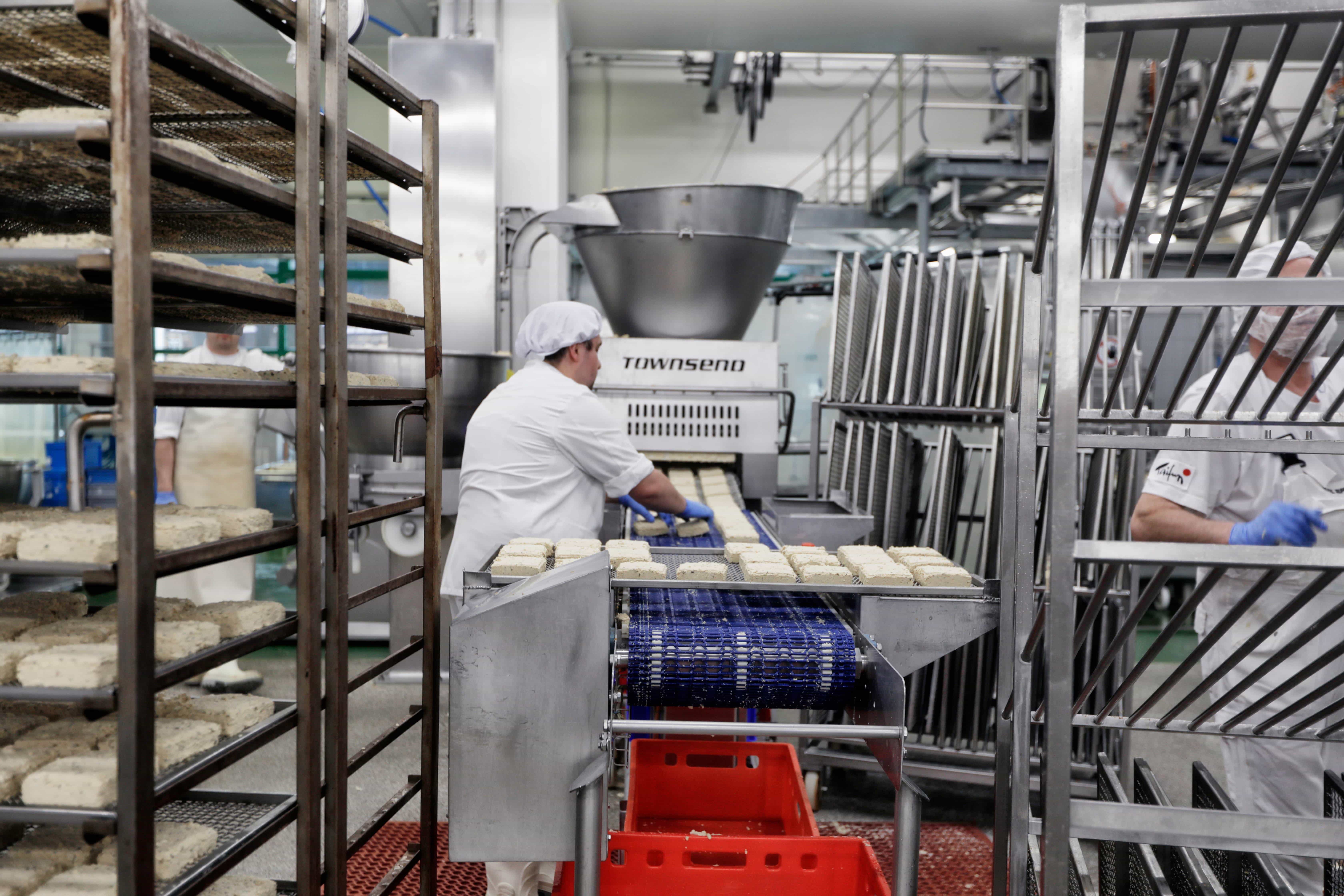From soybean to supermarket
"For us, process management means creating a context in which all parties involved bring their processes into balance, holistically. This is how the individual aspects of the process fit together better. Of course, efficiency and effectiveness also play a role. But our experience is that better processes are also good for people." Valentin Jäger on sustainable process management
Taifun-Tofu GmbH has been producing sustainable tofu products and selling them across Europe for more than 30 years, with a focus on extracting and processing soybeans from organic farming.
In order to successfully master all the individual steps in the journey from soybean on the farm to packaged tofu product, Taifun-Tofu decided to employ professional process management at an enterprise level. Starting in 2012, this new management approach initially required a rethink, but allowed the company to develop a healthy balance between customer, employee, production processes, and compliance needs.
Why sustainable process management is the recipe for success
We talked with Valentin Jäger, Head of Quality Management and IT, about sustainable process management at Taifun-Tofu and the success story of the company.
Taifun-Tofu has grown organically in recent years. Why was professional process management such an important part of this development?
Valentin Jäger: "Truth be told, you can’t really decide to not manage your processes. What’s important, is asking how well these processes are operating within the company, and what that actually means in context. Processes are actually always being modeled, because people are thinking about them.
“This mental modeling is initially sufficient, but only as long as the participants develop similar ideas about a process. But as things get more complex, these mental models no longer fit together. Then people argue or mistakes occur. At this point, visualizing the processes helps everyone communicate better. Here, process modeling gives us the opportunity to make sure we are all on the same page and to reconcile the different ideas of everyone involved."
What role does a professional modeling tool play at Taifun-Tofu?
Valentin Jäger: "It is important for me to work with an easy-to-use management system that can be maintained over the long term. Without a central dictionary, for example, I would have a problem pretty quickly if something were to change. If the changes I make to the stored attributes are not automatically transferred to the diagrams, then this creates a lot of unnecessary manual effort: Only one job title would have to change and I would have to first find, and then update 30 or 40 diagrams.
I therefore believe that professional process management is not possible without a functional software tool. Signavio's solution is very easy to use and can also be used by newcomers. That is to say, it is not a tool available to only a small elite group, but a methodology for as many users as possible.
In my opinion, this approach reflects our corporate philosophy as well as the task which we were facing in 2012: to introduce a holistic management system and to anchor it culturally in the company. "
How has the company changed through the introduction of business process management?
Valentin Jäger: "When I took over quality management, I was faced with the task of establishing a management system. It was clear early on: this would also require professional process management. That's why we got together with the management team right from the start and initially recorded who was responsible for which processes. I would recommend that to anyone who is planning on starting an initiative.
We first looked at the process map from above and broke it down into individual processes. It quickly became clear who is responsible for which processes in the company and which interfaces are involved in the further development. As a result of intensive discussions between our process owners and their work with our process map, we were able to reduce the number of processes from 80 to 30, and to 21 today.
Another breakthrough was that two years ago we adjusted our company hierarchy according to the processes. For us, the hierarchy is derived from the processes and not the other way around. The organizational chart does not determine the processes, rather the processes define the organization chart.
As part of the process initiative, we have abolished the role of business unit manager. Since then, senior management and process owners have been at senior management level. So hierarchy levels have disappeared and this has led to a rethinking of leaders, away from their own areas to focus on the processes."
Which external changes are transforming your processes in the long term?
Valentin Jäger: "One important thing is regulatory changes that require changes in our processes. Documentation also plays an important role here: Regularly checking whether a process complies with the law or remains compliant with the standards we need to meet.
Our retail market is also on the move. But a manufacturing process like ours cannot change so fast. So, when it comes to changing label packaging or automating production, for example, we use process management methods."
What characterizes a successful process with Taifun-Tofu?
Valentin Jäger: "Of course you can define classic criteria such as efficiency and effectiveness. But this narrows my point of view. I imagine a process as something rather organic, something that grows. Through process management, I do not allow it to grow out of control, I am in control.
If I allow this organic development, I need more information about a process than just effectiveness, efficiency, and cost reduction. These criteria alone do not say anything about whether, for example, the employees feel comfortable with this process and whether it really improves their motivation. It's no secret that pressure is harmful over time. Of course, every process has an impact on the people involved."
So you’re saying that process management also promotes balance between employees?
Valentin Jäger: "For us, process management means creating a context in which all participants bring their processes into balance, holistically. This is how the individual aspects of the process fit together better. This not only improves the results of the process, but also improves communication. When people feel comfortable with a process, they experience less friction. This is very important for a healthy corporate culture."
When you think about your corporate culture, what does Tofu and BPM bring together?
Valentin Jäger: "I think tofu is a wonderful product and maybe a small building block for the future of our world. We do not have a second planet where we can live or grow food. But with relatively little soy and acreage, you can already produce quite a lot of tofu, unlike other foods.
The ecological effect is enormous, because our products are certified as organically grown and we produce our seeds ourselves in Europe. This can also have an important economic effect in the future. This reflects our corporate philosophy. We understand freedom as the core value of our company, in the sense of responsibility: I am aware of what I achieve. In this context, I think process management is an excellent tool to think about cause and effect. Sustainable process management is an organic approach that involves the right people at the right time."
At a glance: The positive impact of sustainable process management
Process management at Taifun-Tofu is based on a holistic approach that shapes the culture and everyday operations of the company. The most important results of this process initiative are:
- Processes as a means of communication are anchored in the corporate culture
- Organic growth based on an integrated management system with holistic process management
- Efficient process architecture: reduction from 80 to 21 main processes
- Process-based development of organizational structure and employee roles
- Integrated risk and compliance management with regard to relevant guidelines and certifications
- Optimization and automation of the production process
For more information, read the full Taifun-Tofu success story. Or, if you’re ready to see how Signavio can help you create and maintain sustainable process management within your own organization, why not sign up for a free 30-day trial today?




